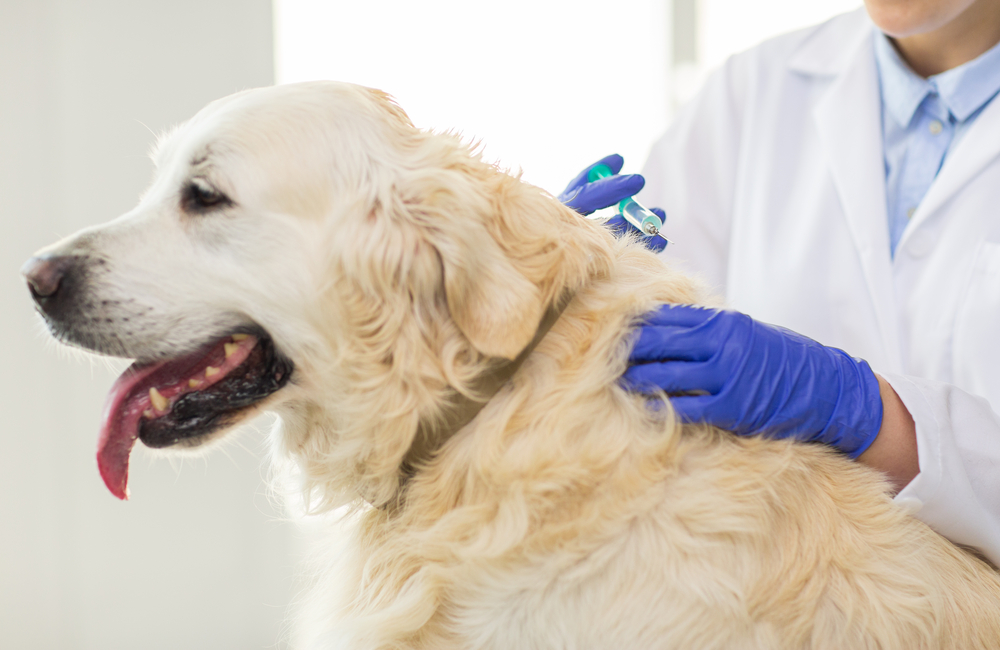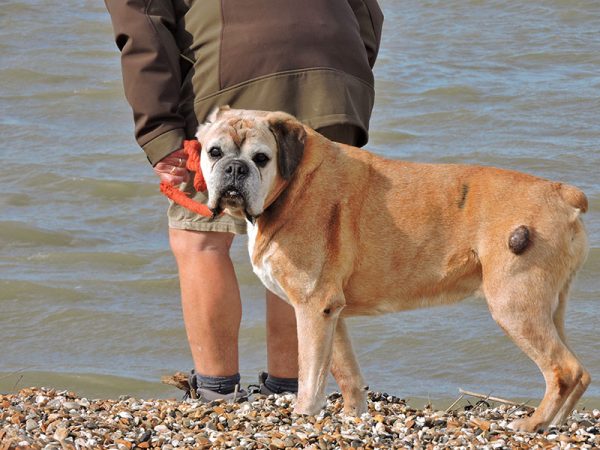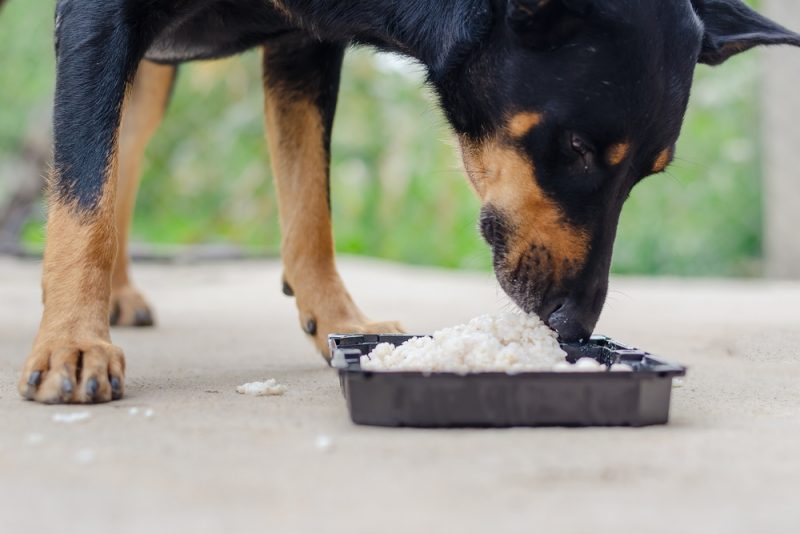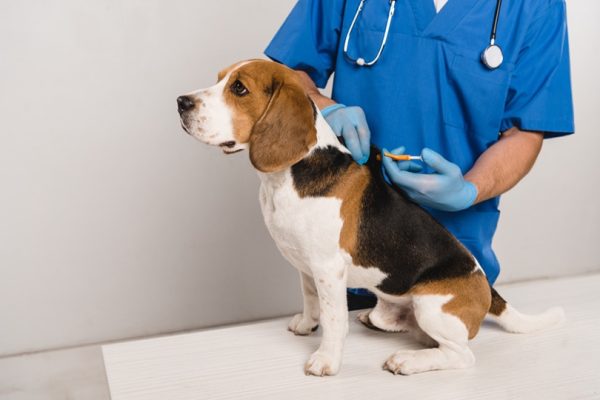In this article
View 3 More +Bringing home a new puppy involves a few trips to the veterinarian. Of course, this is a good chance to discuss all aspects of canine health, including diet, worming, exercise, and training. One important part of puppy vet visits is vaccinations. You’re probably aware that puppies need vaccinations.
However, many people do not know what diseases we’re protecting puppies against, and how important it is to do so. Words like C3, DHP, kennel cough, and more get thrown around. But which dog vaccines are absolutely necessary? Read on to find out!

The 5 Essential Dog Vaccines
1. Distemper
Canine distemper is a serious and life-threatening disease caused by the distemper virus. This virus is spread by exposure to airborne viral particles from an infected dog; it then attacks the respiratory, gastrointestinal, and nervous systems of dogs. Fever, coughing, loss of appetite, vomiting, and diarrhea are common.
If the nervous system is involved, muscle twitches, head tilts, and seizures can occur. Thankfully, there is a highly effective and very safe vaccination that can prevent puppies from getting infected.

2. Hepatitis
Hepatitis is defined as inflammation of the liver. In dogs, this is caused by a member of the adenovirus family. In severe cases, as is often the case in puppies, affected dogs experience fever, depression, loss of appetite, vomiting, diarrhea, and abdominal pain. Some dogs develop edema (fluid swellings) and jaundice (yellow discoloration of the gums).
As with the Distemper virus, vaccination has been very successful at both preventing and reducing the prevalence of hepatitis disease.
3. Parvovirus
Canine parvovirus is a highly contagious viral disease of dogs. It affects puppies more commonly and more severely than adult dogs, causing acute (sudden) gastrointestinal illness. Canine parvovirus can be found in almost any environment. Once ingested, the virus makes its way into rapidly dividing cells, such as those of the bone marrow and the lining of the small intestine.
This results in malaise, fever, and loss of appetite. Almost all dogs experience diarrhea; it is often bloody and foul-smelling. Generally speaking, hospitalization and aggressive treatment are needed. Vaccination of puppies against parvovirus is imperative.
Canine distemper, hepatitis, and parvovirus vaccinations are usually combined into one, meaning they are given as a single injection (followed by follow-up “booster” injections). You might hear this single injection referred to as a “core”, “C3” or “DHP” vaccination.

4. Rabies
Rabies is a deadly disease of many mammalian species, including dogs. This virus is spread through the saliva of infected animals, causing acute and progressive encephalitis (inflammation of the brain). Initially, dogs show vague signs and behavioral changes. Next, they become vicious and behave erratically. Towards the end of the disease process, dogs become weak and paralyzed.
Veterinarians are legally required to vaccinate dogs against rabies in most U.S. states. Widespread vaccination against rabies has dramatically reduced the occurrence of this disease, and ongoing diligent vaccination is essential.
5. Parainfluenza
We’ll preface this by saying that parainfluenza is not technically an essential vaccination, as was the case with 1 through 4. However, veterinarians are routinely vaccinating dogs against the parainfluenza virus to reduce the occurrence and severity of respiratory infection, sometimes referred to as “kennel cough”.
Parainfluenza infection causes a dry, harsh cough, as well as fever and nasal discharge. Infection significantly increases the risk of secondary bacterial infections. Additionally, any dog that is attending a boarding kennel or dog daycare center is required to be vaccinated against parainfluenza.
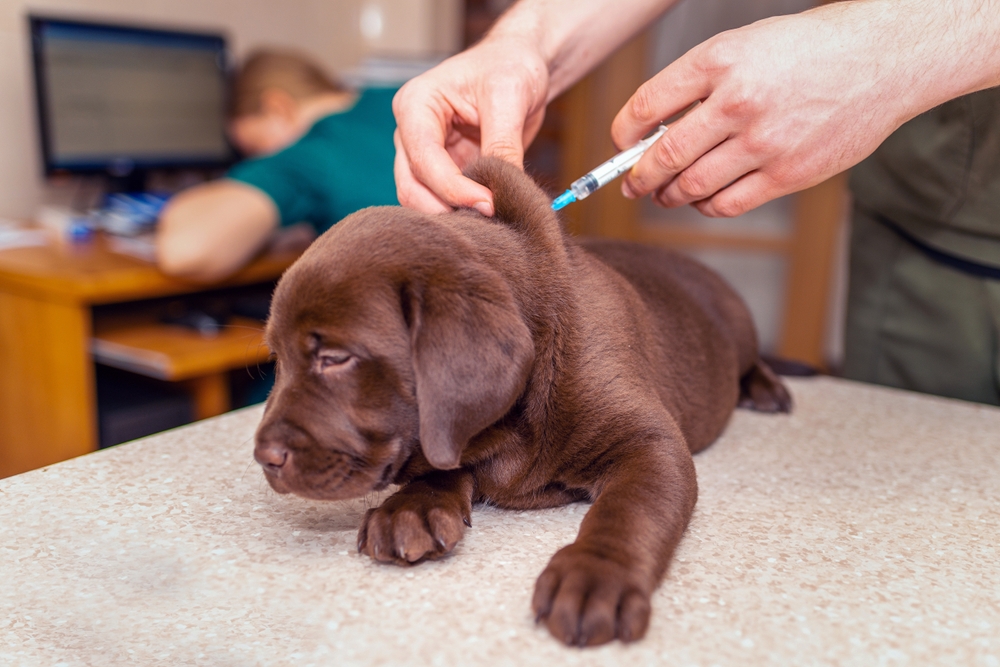

Non-Core Dog Vaccines
Beyond the five vaccinations discussed above, other vaccines are just as essential for some dogs, depending on their location, lifestyle, and risk. These “non-core” or “optional” vaccinations are generally administered on a case-by-case basis, and should be considered with a veterinarian:
- Leptospira
- Lyme disease
- Bordetella
- Rattlesnake toxoid
Consult with a Vet
If you have further concerns about which vaccines are best for your dog, we suggest consulting with a vet for advice.
If you need to speak with a vet but can't get to one, head over to PangoVet. It's our online service where you can talk to a vet online and get the advice you need for your dog — all at an affordable price!


Puppy Vaccination Schedule
Your puppy’s vaccination schedule should be discussed with your veterinarian. While not “set in stone”, there are good guidelines for the age at which each vaccination should be given. The first core vaccination is generally given at 8 weeks of age. The second (“booster”) is given a month later, at 12 weeks of age, and the final vaccination is given a month after this, at 16 weeks of age.
In some instances, the first vaccination may be given earlier, and the last later. The adult vaccination schedule begins one year after the last puppy vaccinations. New guidelines suggest that most core vaccines are effective and protective for 3 years, and so they should be given every 3 years, for life.

Conclusion
Don’t underestimate the importance of puppy vaccinations. They prevent your new canine friend from contracting several serious, potentially fatal diseases. The core or essential vaccinations comprise the Distemper virus, Hepatitis virus, Parvovirus, and Rabies virus. While Parainfluenza vaccination is not essential, it is widely performed.
Other vaccinations, such as Leptospira, should be considered in conjunction with your veterinarian, based on your puppy’s level of risk. Most puppies require a course of at least three core vaccinations. It’s natural to have questions about the effectiveness, safety, and side effects of these vaccinations; we recommend discussing these concerns with your veterinarian during your consultation.
See Also:
- How Much Do Dog & Puppy Vaccinations Cost?
- Lepto Vaccine for Dogs: What to Know & Side Effects (Vet Answer)
Featured Image Credit: Ground Picture, Shutterstock
